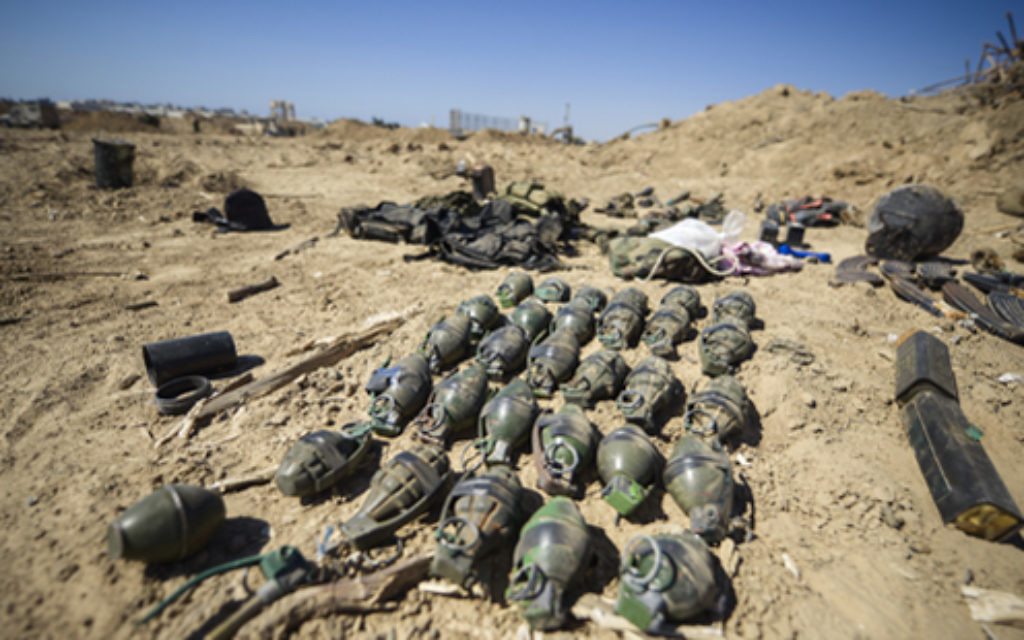Israel and Hamas begin 72 hour ceasefire

A ceasefire between Israel and Hamas meant to last at least three days and end nearly a month of fighting has come into effect in the Gaza Strip.
The truce came ahead of talks in Cairo aimed at brokering a deal which would prevent future cross-border violence.
The temporary truce, agreed to by both sides, started at 8am local time (0500 GMT) and was to last for 72 hours, during which Israel and Hamas are to hold indirect talks in the Egyptian capital.
Get The Jewish News Daily Edition by email and never miss our top stories Free Sign Up
But wide gaps remain and previous international attempts to broker a temporary halt in the fighting have failed. Hamas wants Israel and Egypt to lift their seven-year-old Gaza border blockade. Israel is reluctant to open Gaza’s borders unless Hamas is disarmed.
The situation is still volatile. Just minutes ahead of the start of the truce, shelling still echoed across Gaza and Israel said Hamas fired a heavy barrage of rockets at southern and central Israel.
The war broke out on July 8 when Israel launched air strikes which it said were in response to weeks of heavy rocket fire out of Hamas-controlled Gaza. It expanded the operation on July 17 by sending in ground forces in what it described as a mission to destroy a network of tunnels used to stage attacks.
The fighting has claimed nearly 1,900 Palestinian lives – most of them civilians. The war has also left 67 dead on the Israeli side, all but three of them soldiers.
Talks in Cairo will be crucial in the coming days. Ending the Gaza conflict without a sustainable truce raises the probability of more cross-border fighting in the future.
In the hours leading up to the ceasefire, there were also signs of tensions created by the Gaza fighting spreading to Jerusalem and the West Bank, including two attacks police say were carried out by Palestinian militants.

A unilateral withdrawal would have allowed Israel to end the conflict on its own terms, without engaging in protracted negotiations with Hamas over new border arrangements in Gaza. In such talks, brokered by Egypt, Israel would be asked for concessions it has been unwilling to make, such as opening Gaza’s borders.
Earlier today, the Israeli military announced that all its ground troops would leave Gaza by the start of the new ceasefire.
Military spokesman Lieutenant Colonel Peter Lerner said the withdrawal was going ahead after Israel neutralised cross-border tunnels which were built for Islamic militant attacks inside Israel.
“Overnight, we completed the destruction of 32 tunnels in the Gaza Strip,” he said. “They were part of a strategic Hamas plan to carry out attacks against southern Israel.”
The rocket fire continued throughout the war, and by the time today’s ceasefire began, some 3,500 rockets had been fired at Israel, Lt Col Lerner said. He estimated that Israeli forces destroyed another 3,000 rockets on the ground – but that Hamas has an equal number for future use.
He declined to say how many ground forces had been involved in the Israeli operation, though the military acknowledged calling up 86,000 reservists, including rotations, during the course of its Gaza operation.

Thank you for helping to make Jewish News the leading source of news and opinion for the UK Jewish community. Today we're asking for your invaluable help to continue putting our community first in everything we do.
For as little as £5 a month you can help sustain the vital work we do in celebrating and standing up for Jewish life in Britain.
Jewish News holds our community together and keeps us connected. Like a synagogue, it’s where people turn to feel part of something bigger. It also proudly shows the rest of Britain the vibrancy and rich culture of modern Jewish life.
You can make a quick and easy one-off or monthly contribution of £5, £10, £20 or any other sum you’re comfortable with.
100% of your donation will help us continue celebrating our community, in all its dynamic diversity...
Engaging
Being a community platform means so much more than producing a newspaper and website. One of our proudest roles is media partnering with our invaluable charities to amplify the outstanding work they do to help us all.
Celebrating
There’s no shortage of oys in the world but Jewish News takes every opportunity to celebrate the joys too, through projects like Night of Heroes, 40 Under 40 and other compelling countdowns that make the community kvell with pride.
Pioneering
In the first collaboration between media outlets from different faiths, Jewish News worked with British Muslim TV and Church Times to produce a list of young activists leading the way on interfaith understanding.
Campaigning
Royal Mail issued a stamp honouring Holocaust hero Sir Nicholas Winton after a Jewish News campaign attracted more than 100,000 backers. Jewish Newsalso produces special editions of the paper highlighting pressing issues including mental health and Holocaust remembrance.
Easy access
In an age when news is readily accessible, Jewish News provides high-quality content free online and offline, removing any financial barriers to connecting people.
Voice of our community to wider society
The Jewish News team regularly appears on TV, radio and on the pages of the national press to comment on stories about the Jewish community. Easy access to the paper on the streets of London also means Jewish News provides an invaluable window into the community for the country at large.
We hope you agree all this is worth preserving.
-
By Laurent Vaughan - Senior Associate (Bishop & Sewell Solicitors)
-
By Laurent Vaughan - Senior Associate (Bishop & Sewell Solicitors)
-
By Laurent Vaughan - Senior Associate (Bishop & Sewell Solicitors)
-
By Laurent Vaughan - Senior Associate (Bishop & Sewell Solicitors)






















